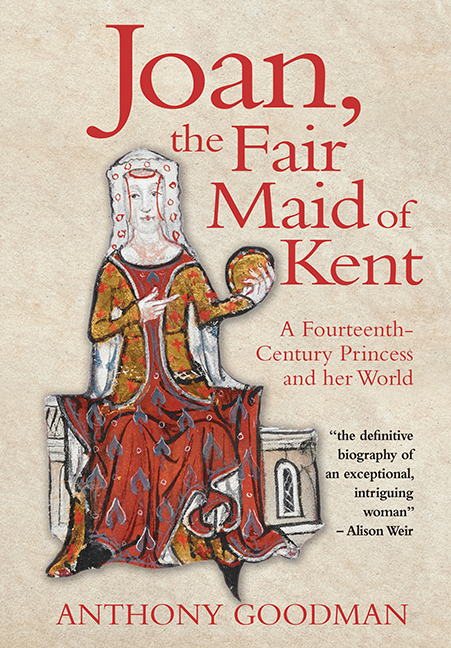Book contents
- Frontmatter
- Dedication
- Contents
- List of Illustrations
- List of Abbreviations
- Maps
- Genealogical Tables
- 1 Loosened Bonds
- 2 Tragic Beginnings
- 3 Bigamy
- 4 Married Bliss
- 5 A Whirlwind Rom
- 6 Princess of Wales and of Aquitaine
- 7 Deaths of Princes
- 8 The King's Mother
- 9 Terrors and Tribulations
- 10 Venus Ascending?
- Notes
- Bibliography
- Acknowledgements
- Index
9 - Terrors and Tribulations
Published online by Cambridge University Press: 25 October 2017
- Frontmatter
- Dedication
- Contents
- List of Illustrations
- List of Abbreviations
- Maps
- Genealogical Tables
- 1 Loosened Bonds
- 2 Tragic Beginnings
- 3 Bigamy
- 4 Married Bliss
- 5 A Whirlwind Rom
- 6 Princess of Wales and of Aquitaine
- 7 Deaths of Princes
- 8 The King's Mother
- 9 Terrors and Tribulations
- 10 Venus Ascending?
- Notes
- Bibliography
- Acknowledgements
- Index
Summary
A CONSOLATION FOR JOAN, in the midst of her mourning for Blanche, was that she received the Wake properties which Blanche had held as dower, including those in Lincolnshire, where the centre of Joan's family piety as the widow of Thomas Holand was at Stamford. The favours which were bestowed by the Crown in June 1381 on Bourne Abbey and Ware Priory at Joan's petition suggest that she may have travelled as far north as Lincolnshire in order to be greeted as ‘the lady’, to inspect the estates, and receive petitions from the monks, canons and tenants newly come into her lordship. If she thought that all augured well for the immediate future, she could not have been more mistaken. For 1381 was to be an annus horribilis for Joan. It was the year of the Peasants’ Revolt (see Plate VII). The rebel bands from Kent and Essex, who briefly occupied London, were stung to fury by attempts to collect the harsh poll tax granted in parliament. Some of their leaders promoted reforms which, at their most drastic, would have undermined the dominance of the nobility and, at their most moderate, would have adversely affected the estate profits and related labour costs of landowners. There were also some regional and many localised risings directed against the unpopular regimes of particular landowners and urban elites, especially in parts of southern England. On those hot, turbulent June days in rebel-controlled London, Joan must have feared for her life, and the lives of her son the king, of her other two sons and her daughter Joan, and other vulnerable kinsfolk, friends and servants. She must have wondered whether John of Gaunt, a particular target for the commons’ wrath, and his family would escape death, as, indeed, they did after various vicissitudes. The duke was widely blamed for the poll tax, and the failures in war. He was fortunate to have been distant from London, negotiating with the Scots, when the revolts broke out.
There was, indeed, a reason why Joan is likely to have been especially fearful of a popular rising. She had gone to live in Aquitaine six years after the Jacquerie, when French peasants had risen in arms and tortured and massacred nobles of both sexes with extreme cruelty.
- Type
- Chapter
- Information
- Joan, the Fair Maid of KentA Fourteenth-Century Princess and her World, pp. 152 - 173Publisher: Boydell & BrewerPrint publication year: 2017



